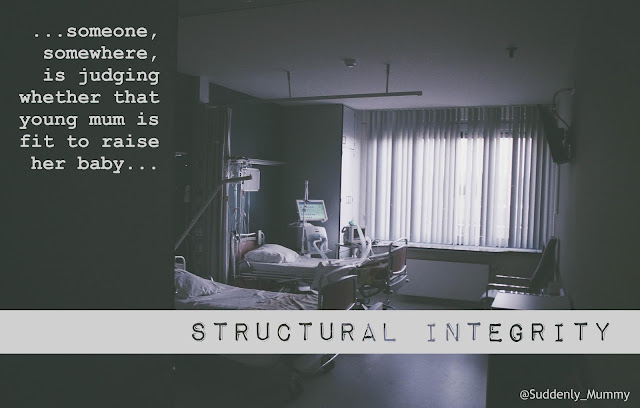When EduTwitter Meets Adoption Twitter
EduTwitter is a world I have only touched the edges of. Despite a decade out of the classroom I think it's probably true that once a teacher, always a teacher. My ears prick up at education news and occasionally I can't resist tracking a good thread or watching a debate unfold.
Adoption Twitter is where I spend most of my Twitter time but, every so often, the two worlds collide. It usually happens because an adoptive parent has tweeted in despair at some difficulty their child is experiencing at school, or because an EduTwitter bod has said something about 'zero-tolerance' or whatever.
Of course, EduTwitter is not a homogenous world, and many within it are advocating more attachment-friendly approaches to 'behaviour management' (awkward term, don't you think?). Nonetheless, when adoptive parents start going on about 'relationships', 'empathy' and 'attachment' there is often a pushback. Things can sometimes get heated, with both sides becoming exasperated that the other doesn't seem to 'get' their position.
Many times, as I've watched these conversations unfold, it has struck me that some of the objections that are raised to adopting an attachment or trauma focus in education are based on faulty assumptions.
So, teachers, may I myth-bust a little?
We don't expect you to ignore dangerous or extremely disruptive behaviour
Yes, if a child is throwing furniture around, or seriously disrupting other pupils' learning then they probably need removing from the room. As parents, we'd probably support that, as kicking off in front of everyone is not a good state for our children to be in and being removed to a quiet, calm place might be the re-set everybody needs. We may even be able to understand that frequent temporary exclusions can be a way to 'protect' other students, just so long as we all agree that they are doing little or nothing to actually help our disruptive children in the long run.We don't want to tell you how to teach
I have no idea how to teach, say, Maths. Unpacking the mystery of simultaneous equations is beyond me. This is not about your teaching methods.It's not about 'trad' v 'prog'
Similarly, it's not about your teaching style. Being trauma and attachment aware is not a 'prog' thing. In fact most of our children will benefit from structure, routine, clear classroom boundaries fairly applied, and a sense of order and discipline. All of these things can make children feel safe. When they feel safe, they are more likely to be able to learn. Chaos, noise, people coming and going, unpredictability - all of these things can upend a child whose early life contained too much of those things already.We don't want you to be a 'therapist'
Chances are we already have a therapist. We don't want amateur therapy anymore than you want to be an amateur therapist. Please do not attempt therapy with our children.We don't expect you to 'fix' our children
Our children are not problems to be 'fixed'. We understand that you have a job to do and that our child is just one of 30 children in your classroom, all with differing needs. Teachers are not expected to 'fix' autism, or dyslexia, but rather to make reasonable adjustments so that children with these particular needs can achieve to their potential. Many of the adjustments that work for children who have experienced early trauma or attachment difficulties will have a positive impact on all the children in the classroom.We don't want you to spend a fortune
Schools are short of money, and teachers are short of time. But making small alterations to classroom layout, greeting a child by name in the corridor, allowing a child to bring an attachment object from home, letting a child be dropped off for school at a different and less crowded door, giving a child an 'escape' card, re-thinking public behaviour charts - none of these things cost a penny.We're not asking you to do our job for us
It seems that every two minutes someone makes a pronouncement about something that was previously a parents' responsibility that apparently now ought to be covered in school and, in classrooms everywhere, teachers' eyes start rolling. Mine certainly did. We're not asking you to do our job. We're asking you to work with us as we do it.So, what do we want?
In the first place, a willingness to listen and to consider that what we are telling you about our children may just be true, and not the figment of a neurotic parent's fevered imagination.Secondly, to hold what you know about our children in mind when you are dealing with them. When I used to mark children's work, I held the fact that some children were dyslexic in mind as I wielded my pen. It's not about making excuses for them, but about working realistically with them and recognising progress and effort where it happens, even though the end result of the child's efforts may be well adrift of that of other students.
Thirdly, a little empathy. If you've ever snapped, lost it, after a long, hard, stressful day, or because you were tired, or because you were worried about something, or just because your head wasn't in it that day, then you know how our children feel day in, day out.
Many children who are looked after, adopted, in kinship care or living with a special guardian are struggling not only with the same things that all other children sometimes struggle with, but are also carrying a weighty backpack filled with a selection from FASD, sensory integration problems, executive functioning difficulties, shame, anxiety, over-active fight-flight-freeze reflexes, poor co-ordination and low physical strength, crippling low self-esteem, speech and language delay, developmental trauma and more. Yes, training, resources, extra staff members and so on would be ideal, but awareness, understanding and empathy will go a long, long way.







Comments
Post a Comment